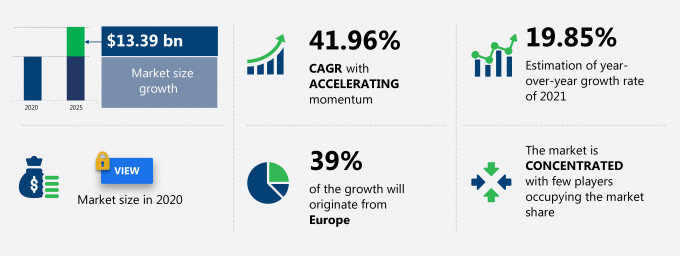The automotive intelligent tires market share is expected to increase by USD 13.39 billion from 2020 to 2025, and the market’s growth momentum will accelerate at a CAGR of 41.96%.
This automotive intelligent tires market research report provides valuable insights on the post COVID-19 impact on the market, which will help companies evaluate their business approaches. Furthermore, this report extensively covers automotive intelligent tires market segmentations by application (commercial vehicles and passenger cars) and geography (Europe, North America, APAC, South America, and MEA). The automotive intelligent tires market report also offers information on several market vendors, including Bridgestone Corp., Continental AG, Hankook Tire & Technology Co. Ltd., Michelin Group, Nokian Tyres Plc, Pirelli Tyre Spa, Sumitomo Rubber Industries Ltd., The Goodyear Tire & Rubber Co., Toyo Tire Corp., and Yokohama Rubber Co. Ltd. among others.
What will the Automotive Intelligent Tires Market Size be During the Forecast Period?
Download Report Sample to Unlock the Automotive Intelligent Tires Market Size for the Forecast Period and Other Important Statistics
Automotive Intelligent Tires Market: Key Drivers, Trends, and Challenges
The increasing need for safe tires is notably driving the automotive intelligent tires market growth, although factors such as the commercial viability of intelligent tires may impede the market growth. Our research analysts have studied the historical data and deduced the key market drivers and the COVID-19 pandemic impact on the automotive intelligent tires industry. The holistic analysis of the drivers will help in deducing end goals and refining marketing strategies to gain a competitive edge.
Key Automotive Intelligent Tires Market Driver
The increasing need for safe tires is one of the key factors driving the growth of the global automotive intelligent tires market. Tires form a critical point of contact between the vehicle and the road. The grip of a tire plays a crucial role in maintaining vehicle control during a sudden braking situation. The increasing number of on-road accidents is a major cause that is driving automakers to develop advanced driver-assisted safety technologies. A significant percentage of road accidents are caused due to under-inflated or worn-out tires. Intelligent tires provide advanced warning to the driver and the tire manufacturer regarding the stability of the tire and the impending need for a tire replacement. This enables tire manufacturers to make the necessary stock available at the nearest tire dealership. Most tire-related issues are caused due to the development of slow air leaks in the tire. Tire makers can leverage the big data generated by intelligent tires to detect the root cause of slow air leaks and work to eliminate this threat in their future tire models. Hence, with the increasing awareness among customers, the demand for TPMS will increase in the market, which, in turn, will push the adoption of intelligent tires during the forecast period.
Key Automotive Intelligent Tires Market Trend
The use of IMU sensors in intelligent tires will fuel the global automotive intelligent tires market growth. An inertial measurement unit (IMU) refers to a fusion sensor unit (a combo sensor), which is basically a box containing three accelerometers and three gyroscopes. The accelerometers are oriented in such a manner that their axes are orthogonal to each other. These serve to measure the amount of G-force that the IMU is being subjected to. The gyroscopes are also placed in a similar pattern. These measure the rotational position of the unit using either absolute or relative coordinate reference systems. The choice of the coordinate reference system depends on the end-use of the gyroscope in the vehicle. However, Intelligent TPMS typically uses an acceleration sensor module, which is known as a G sensor. These sensors are quite rugged, as they are placed inside tires where there is the incidence of both extreme heat and high torque. The sensors used here need to be capable of withstanding vehicle speeds of up to 300 kmph, as well as an acceleration of up to 1,000 G. It is expected that an integrated and fool-proof approach for the G sensor will be substituted by an IMU sensor.
Key Automotive Intelligent Tires Market Challenge
The commercial viability of intelligent tires is a major challenge for the global automotive intelligent tires market growth. Intelligent tires require advanced connectivity systems, hardware consisting of an array of sensors, supporting vehicle hardware and software, and subscription services to operate. Equipping a vehicle with intelligent tires will significantly increase production costs, driving up vehicle prices. Hence, initially, the practical application of intelligent tires will be limited to luxury or top-end vehicle models with inflated price tags. The high cost of installing and operating intelligent tires limits its commercial viability in entry-level and mid-segment passenger cars. The sensors used in intelligent tires cost close to $1,000 due to their complex-built. Geography and availability of local resources further affect the pricing of these sensors. The majority of the market for intelligent tires exists in the Americas and Europe. Hence, vehicle makers based in APAC need to import the required sensors for intelligent tires. The adoption of intelligent tires will be limited to luxury vehicles during the forecast period.
This automotive intelligent tires market analysis report also provides detailed information on other upcoming trends and challenges that will have a far-reaching effect on the market growth. The actionable insights on the trends and challenges will help companies evaluate and develop growth strategies for 2021-2025.
Parent Market Analysis
Technavio categorizes the global automotive intelligent tires market as a part of the global tires and rubber market within the global auto components market. Our research report has extensively covered external factors influencing the parent market growth potential in the coming years, which will determine the levels of growth of the automotive intelligent tires market during the forecast period.
Who are the Major Automotive Intelligent Tires Market Vendors?
The report analyzes the market’s competitive landscape and offers information on several market vendors, including:
- Bridgestone Corp.
- Continental AG
- Hankook Tire & Technology Co. Ltd.
- Michelin Group
- Nokian Tyres Plc
- Pirelli Tyre Spa
- Sumitomo Rubber Industries Ltd.
- The Goodyear Tire & Rubber Co.
- Toyo Tire Corp.
- Yokohama Rubber Co. Ltd.
This statistical study of the automotive intelligent tires market encompasses successful business strategies deployed by the key vendors. The automotive intelligent tires market is concentrated and the vendors are deploying organic and inorganic growth strategies to compete in the market.
Product Insights and News
- Bridgestone Corp. - The company offers intelligent tires capable of estimating a wheel axle load and tire wear condition by using sensors attached inside tires that measure the change in strain that occurs when a tire makes contact with the road while in motion.
To make the most of the opportunities and recover from post COVID-19 impact, market vendors should focus more on the growth prospects in the fast-growing segments, while maintaining their positions in the slow-growing segments.
The automotive intelligent tires market forecast report offers in-depth insights into key vendor profiles. The profiles include information on the production, sustainability, and prospects of the leading companies.
Automotive Intelligent Tires Market Value Chain Analysis
Our report provides extensive information on the value chain analysis for the automotive intelligent tires market, which vendors can leverage to gain a competitive advantage during the forecast period. The end-to-end understanding of the value chain is essential in profit margin optimization and evaluation of business strategies. The data available in our value chain analysis segment can help vendors drive costs and enhance customer services during the forecast period.
The value chain of the global auto components market includes the following core components:
- Inputs
- Inbound logistics
- Operations
- Outbound logistics
- Marketing and sales
- Service
- Support activities
- Innovation
The report has further elucidated on other innovative approaches being followed by manufacturers to ensure a sustainable market presence.
Which are the Key Regions for Automotive Intelligent Tires Market?
For more insights on the market share of various regions Request PDF Sample now!
39% of the market’s growth will originate from Europe during the forecast period. Germany and France are the key markets for automotive intelligent tires market in Europe. Market growth in this region will be slower than the growth of the market in regions.
The increasing need for safe tires will facilitate the automotive intelligent tires market growth in Europe over the forecast period. This market research report entails detailed information on the competitive intelligence, marketing gaps, and regional opportunities in store for vendors, which will assist in creating efficient business plans.
COVID Impact and Recovery Analysis
The outbreak of COVID-19 led to lockdowns and travel bans across Europe and slowed down the growth of the automotive components market, which includes automotive intelligent tires, in 2020. Furthermore, the rising number of COVID-19 cases in major EU countries, such as the UK and Germany, in Q1 2021 has affected the growth of the automotive intelligent tires market in the region. However, the relaxation of lockdown measures and the partial reopening of the offline distribution channel in some countries in the region are likely to enhance the growth of the automotive intelligent tires market in Europe during the forecast period.
What are the Revenue-generating Application Segments in the Automotive Intelligent Tires Market?
To gain further insights on the market contribution of various segments Request PDF Sample
The automotive intelligent tires market share growth by the Commercial vehicles segment will be significant during the forecast period. CVs are witnessing high demand owing to an increase in demand for logistics and growth in industrial, mining, and construction activities. The global automotive industry is witnessing numerous innovations in terms of technology, along with growing concerns for efficient fuel combustion. These factors will positively drive the adoption of CVs by end-users globally
This report provides an accurate prediction of the contribution of all the segments to the growth of the automotive intelligent tires market size and actionable market insights on post COVID-19 impact on each segment.
|
Automotive Intelligent Tires Market Scope |
|
|
Report Coverage |
Details |
|
Page number |
120 |
|
Base year |
2020 |
|
Forecast period |
2021-2025 |
|
Growth momentum & CAGR |
Accelerate at a CAGR of 41.96% |
|
Market growth 2021-2025 |
$ 13.39 billion |
|
Market structure |
Concentrated |
|
YoY growth (%) |
19.85 |
|
Regional analysis |
Europe, North America, APAC, South America, and MEA |
|
Performing market contribution |
Europe at 39% |
|
Key consumer countries |
US, Germany, China, Canada, and France |
|
Competitive landscape |
Leading companies, Competitive strategies, Consumer engagement scope |
|
Key companies profiled |
Bridgestone Corp., Continental AG, Hankook Tire & Technology Co. Ltd., Michelin Group, Nokian Tyres Plc, Pirelli Tyre Spa, Sumitomo Rubber Industries Ltd., The Goodyear Tire & Rubber Co., Toyo Tire Corp., and Yokohama Rubber Co. Ltd. |
|
Market dynamics |
Parent market analysis, Market growth inducers and obstacles, Fast-growing and slow-growing segment analysis, COVID 19 impact and recovery analysis and future consumer dynamics, Market condition analysis for forecast period |
|
Customization purview |
If our report has not included the data that you are looking for, you can reach out to our analysts and get segments customized. |
What are the Key Data Covered in this Automotive Intelligent Tires Market Report?
- CAGR of the market during the forecast period 2021-2025
- Detailed information on factors that will drive automotive intelligent tires market growth during the next five years
- Precise estimation of the automotive intelligent tires market size and its contribution to the parent market
- Accurate predictions on upcoming trends and changes in consumer behavior
- The growth of the automotive intelligent tires industry across Europe, North America, APAC, South America, and MEA
- A thorough analysis of the market’s competitive landscape and detailed information on vendors
- Comprehensive details of factors that will challenge the growth of automotive intelligent tires market vendors
We can help! Our analysts can customize this report to meet your requirements. Get in touch



